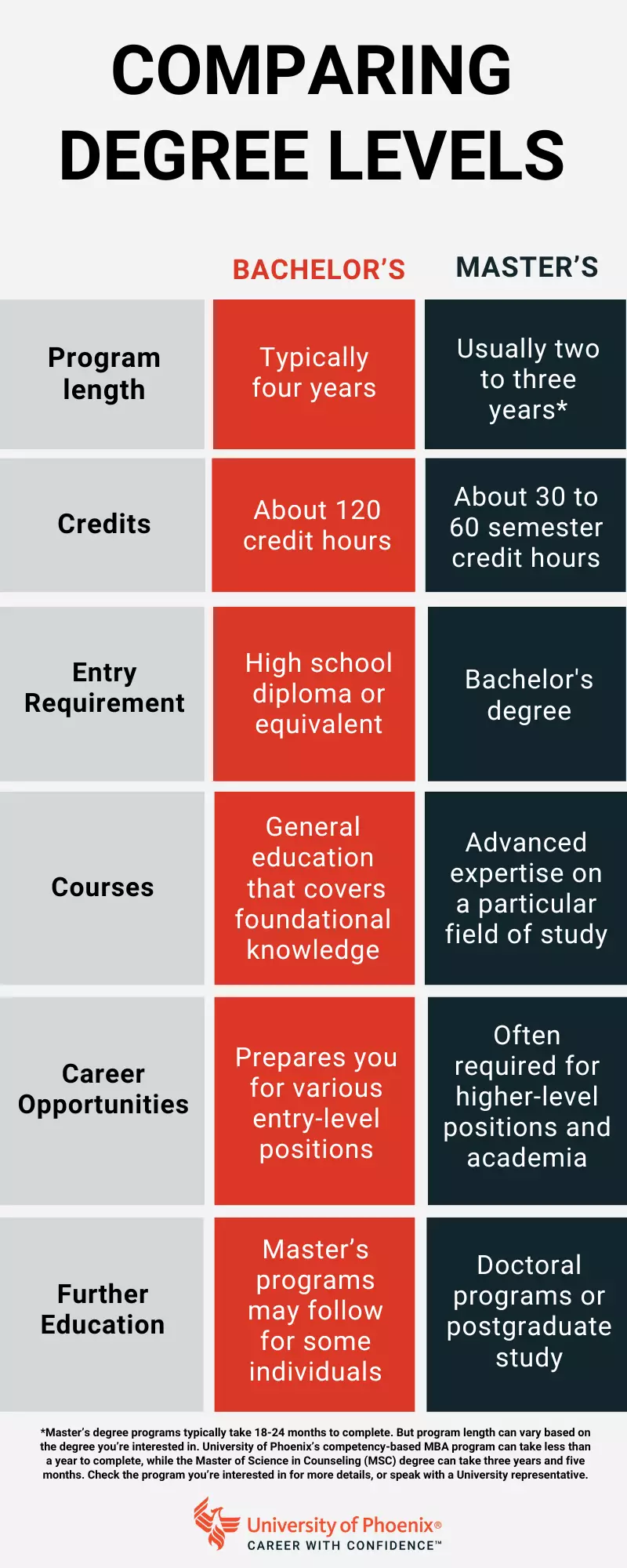Key differences between bachelor’s and master’s degrees
This article was updated on June 12, 2024.

Written by Michael Feder

Reviewed by Marc Booker, PhD, Vice Provost, Strategy

When most people think about going to college, they’re usually thinking about the pursuit of a bachelor’s degree. A four-year program is often a common entry point to a college education, but it’s not the only one. Depending on their goals, students have access to four types of degrees :
- Associate degree
- Bachelor’s degree
- Master’s degree
- Doctorate
A bachelor’s degree is often seen as a next step after high school, as career preparation to enter the workforce. It can equip people with the necessary education and skills for various industries, and it signals to employers that a person is qualified for a role. It also displays a commitment of time and discipline necessary for most jobs.
If you’re curious about how a bachelor’s degree may be a factor in today’s job market, the National Association of Colleges and Employers (NACE) 2023 recruiting benchmarks report found 68% of entry-level positions require a bachelor’s degree. In terms of job openings, the U.S. Bureau of Labor Statistics projects occupations that typically require a bachelor’s degree are projected to have 3.3 million openings each year
between 2022 and 2032.
A master’s degree follows a bachelor’s degree and is a means of furthering one’s knowledge and skills, demonstrating a mastery of a professional practice. This degree may be required for employment in specific industries — like research or teaching — and can help showcase leadership abilities to employers.
These degree paths may seem linear, but it’s not always cut and dry. Some people pursue a second bachelor’s degree, while others may feel they need a master’s for their personal and career goals. For example, suppose you’re entering a profession that requires a certain level of education, trying to earn a promotion or starting a new job. In these cases, it’s important to understand the difference between a bachelor’s and a master’s degree.
BLS Occupational Employment Projections, 2022-2032 is published by the U.S. Bureau of Labor Statistics. This data reflects BLS’ projections of national (not local) conditions. These data points are not specific to University of Phoenix students or graduates.
What is a bachelor’s degree?
A bachelor’s degree is a four-year program of study through which students develop skills and understanding of their program of choice at a college or university, either online or in person. Many students pursue a bachelor’s degree immediately after high school, but it’s not uncommon for adults to complete a degree later in life.
Bachelor’s programs typically cover the core educational elements of an area of study, giving you a working knowledge of many topics. After meeting general education requirements, you’ll move on to advanced courses in your preferred subject area. In addition, you may also sprinkle in elective courses to expand your knowledge.
Some students may take general education credits they accumulate at one institution (like a community college) and transfer them to another school to earn their degree. This process can help save money in the long run.
Why is it important to go to school and earn a bachelor’s degree?
Students often pursue a bachelor’s degree to enhance career opportunities. In 2021, 23.5% of the U.S. population age 25 or older had a bachelor’s degree, according to the U.S. Census Bureau. As noted above, a bachelor’s has become a common requirement by employers for consideration for a number of jobs.
We spoke with Marc Booker, PhD, vice provost of strategy at University of Phoenix about how there is value in a bachelor’s degree for many prospective students: “The value of earning a bachelor’s degree goes beyond just the knowledge obtained in the credential itself. It also demonstrates the skills of the learner connected to persistence, determination and navigating through organizational processes.”
Bachelor’s degree programs
Within the bachelor’s degree category, students have access to different degrees: the Bachelor of Arts (BA), Bachelor of Science (BS) and Bachelor of Fine Arts (BFA). But what are the differences among the three?
Bachelor of Arts
One of the most common bachelor’s degrees, a Bachelor of Arts generally focuses on a discipline of the arts or humanities. This type of degree program is centered more on each student’s individual exploration of a given subject.
Bachelor of Science
A Bachelor of Science tends to focus more on science and math than a BA or BFA does. The focus of study generally remains on the specific subjects related to the degree.
Bachelor of Fine Arts
A BFA is similar to a BA but generally focuses on the arts, specifically the performing arts, visual arts and music. These programs tend to emphasize hands-on learning in a studio.
Bachelor’s degree requirements
Admissions requirements for bachelor’s degrees can vary by program. All University of Phoenix bachelor’s degrees require applicants to have an acceptable and official high school diploma or state-sanctioned equivalency diploma. International students must have a foreign secondary school equivalent. In addition, students must be U.S. citizens or have a valid visa.
Each bachelor’s degree program generally has its own requirements for completion. These requirements include a mixture of general education and specialized, program-specific courses. Combined, these courses and experiences make up 120 semester credits.
Time to complete a bachelor’s degree
Bachelor’s programs often take four years to complete, but it is possible to expedite your degree and save money by transferring eligible credits from accredited institutions or applying to see if relevant work and life experience may count as credit toward your degree, reducing the number of courses you need to take.
One of the biggest benefits of online classes is the ability to schedule courses that fit into your schedule and enable you to get your degree on time.
What is a master’s degree?
A master’s degree is an advanced graduate degree that can be pursued after you have completed a bachelor’s degree. Earning a master’s degree helps establish expertise in a field and can help prepare graduates to take on more responsibility and pursue leadership positions.
People pursue master’s degrees for a variety of reasons . Some students are looking to increase their chances of employment or seek more job security. Others would like to switch careers.
Additionally, earning a master’s gives you more opportunities to conduct research and contribute to your chosen field.
“Think of a master’s degree as a deep dive and immersion into a specific content area where you can refine your expertise and leadership abilities to further your workplace or community,” shares Dr. Booker. “The exposure you will get to in-depth reviews of thought leaders and practitioners in a subject area to expand your network from the degree that can be applied to improving your communities can be seen as even more valuable.”
Master’s degree programs
There are three types of master’s degrees, which align similarly with the bachelor’s degrees, but the three are not exhaustive and the master’s degree can be tied directly to the subject matter itself, like a Master of Management or Master of Business Administration:
- Master of Arts (MA)
- Master of Science (MS)
- Master of Fine Arts (MFA)
Master’s degree requirements
Master’s degree programs often have unique requirements for completion. Unlike bachelor’s degrees, however, there is no general education requirement. Students instead focus on their field of study.
To enter a master’s degree program at University of Phoenix, at a minimum you must have a valid bachelor’s degree from an approved college or university with institutional accreditation (or a comparable degree from an international institution). You must also have a cumulative GPA of 2.5 (on a 4.0 scale). Finally, you must complete all required forms and submit official test scores and transcripts.
Time to complete a master’s degree
A master’s degree tends to be much more rigorous than a bachelor's degree program since it takes an intensive approach to specialized expertise. The length of a master’s degree program typically varies with the institution and subject.
As with a bachelor’s degree, some master’s programs offer ways to save time and money. Competency-based programs in business and nursing, for example, allow professionals with strong work experience to leverage that background in a more self-directed type environment.
Understanding bachelor’s vs. master’s programs
One thing to keep in mind about bachelor’s and master’s degrees is that they don’t compete with each other. They’re both steps along an educational journey. Each offers unique benefits and challenges and opens different pathways for professional knowledge.
Whether you’re considering going back to school for your master’s degree o seeking out a new educational path with a bachelor’s program, University of Phoenix offers flexible, online degree programs that allow you to pursue your educational goals by teaching relevant career skills. And with the full support of the University’s Career Services for Life® commitment, mentors, alumni groups and academic counselors, you won’t have to pursue those goals alone.
Bachelor’s degrees at University of Phoenix
University of Phoenix offers several online bachelor’s degree programs to help professionals within almost every field expand their expertise. The following list of bachelor’s programs includes some of the most popular fields of study:
- Bachelor of Science in Business
- Bachelor of Science in Management
- Bachelor of Science in Accounting
- Bachelor of Science in Communication
- Bachelor of Science in Information Technology
- Bachelor of Science in Computer Science
- Bachelor of Science in Data Science
- Bachelor of Science in Cybersecurity
- Bachelor of Science in Health Management
- Bachelor of Science in Health Administration
- Registered Nurse to Bachelor of Science in Nursing (RN-BSN)
- Bachelor of Science in Education
- Bachelor of Science in Criminal Justice Administration
- Bachelor of Science in Public Administration
Master's degrees at University of Phoenix
University of Phoenix offers several online master’s degree programs for professionals in fields like business, education, healthcare and education. Some of the most popular programs are:
- Master of Business Administration (MBA)
- Master of Management
- Master of Science in Cybersecurity
- Master of Information Systems
- Master of Science in Data Science
- Master of Health Administration
- Master of Science in Nursing
- Master of Arts in Education
- Master of Public Administration
Request more information about our online degree programs or apply for entry
today.

ABOUT THE AUTHOR
A graduate of Johns Hopkins University and its Writing Seminars program and winner of the Stephen A. Dixon Literary Prize, Michael Feder brings an eye for detail and a passion for research to every article he writes. His academic and professional background includes experience in marketing, content development, script writing and SEO. Today, he works as a multimedia specialist at University of Phoenix where he covers a variety of topics ranging from healthcare to IT.

ABOUT THE REVIEWER
Dr. Marc Booker, University of Phoenix Vice Provost for Strategy, has more than two decades of experience working with online and distance education students at the post-secondary level. He currently oversees critical path academic initiatives to improve the student experience. Dr. Booker is a regular speaker, author and contributor to national higher education associations.
This article has been vetted by University of Phoenix's editorial advisory committee.
Read more about our editorial process.
Read more articles like this:



